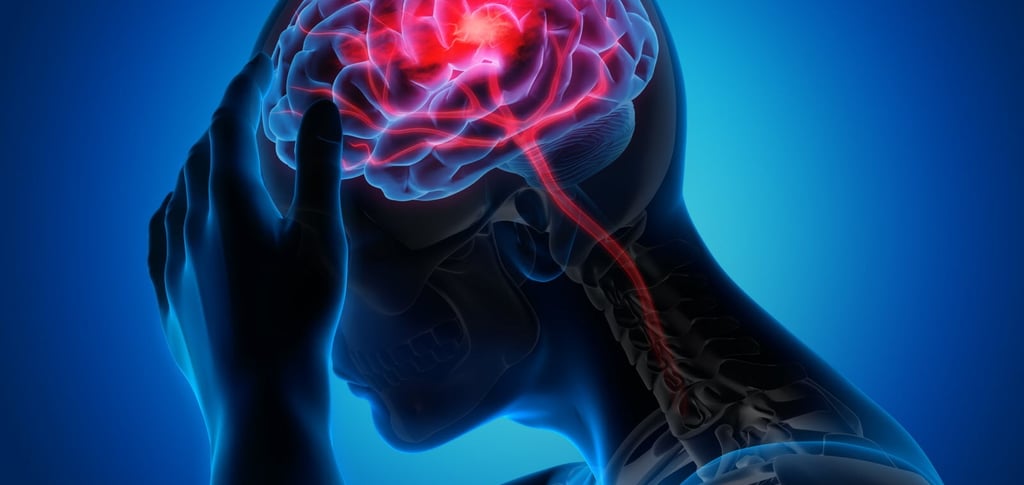Reduce Your Stroke Risk by 80% with a Healthy Lifestyle: Doctors' Advice!
Did you know that a healthy lifestyle can significantly reduce your stroke risk? Discover doctors' advice for a healthier and more serene life.
HEALTHBLOG-LIST
10/29/20243 min read


A stroke is a medical emergency that occurs when blood flow to the brain is interrupted. The consequences can be severe, ranging from paralysis to speech disorders, and even death. The good news? According to doctors, adopting a healthy lifestyle can reduce stroke risk by up to 80%! In this article, we’ll explore health professionals' recommendations to help you take care of your brain and live a longer, healthier life.
Quick Overview:
* A healthy lifestyle can reduce stroke risk by 80%.
* Stroke risk factors include high blood pressure, smoking, high cholesterol, and diabetes.
* Adopting a balanced diet, exercising regularly, and managing stress are essential for stroke prevention.
* Regularly visiting a doctor to monitor cardiovascular health is important.
Contents
1. Understanding Stroke Risk Factors
2. Nutrition: Your Ally Against Stroke
3. Move for Your Brain!
4. Stress: The Silent Enemy
5. Regular Check-Ups with Your Doctor
6. FAQ
7. Conclusion
1. Understanding Stroke Risk Factors
Before diving into prevention tips, it's crucial to understand stroke risk factors. Some are modifiable, others are not.
Non-Modifiable Risk Factors:
* Age: Stroke risk increases with age.
* Family History: If a family member has had a stroke, your risk is higher.
* Gender: Men are slightly more at risk than women.
Modifiable Risk Factors:
* High Blood Pressure: This is the primary stroke risk factor.
* Smoking: Smoking damages blood vessels and increases blood pressure.
* High Cholesterol: High cholesterol can cause plaque buildup in arteries, obstructing blood flow.
* Diabetes: Diabetes damages blood vessels and increases blood clot risk.
* Obesity: Excess weight raises the risk of high blood pressure, diabetes, and high cholesterol.
* Excessive Alcohol Consumption: Alcohol can raise blood pressure and triglyceride levels.
* Physical Inactivity: Regular exercise helps maintain a healthy weight and reduce blood pressure.
* Stress: Chronic stress can raise blood pressure and the risk of blood clots.
By acting on these modifiable factors, you can significantly reduce your stroke risk.
2. Nutrition: Your Ally Against Stroke
A healthy, balanced diet is essential in stroke prevention. Here are some tips for a “stroke-prevention” diet:
* Prioritize Fruits and Vegetables: Rich in vitamins, minerals, and antioxidants, they protect your blood vessels.
* Choose Whole Grains: They are high in fiber and help regulate cholesterol and blood sugar.
* Opt for Lean Proteins: Fish, poultry, legumes... They are essential for muscle and blood vessel health.
* Limit Saturated and Trans Fats: Mainly found in processed foods, red meats, and high-fat dairy products.
* Reduce Salt Intake: Excess salt promotes high blood pressure.
* Moderate Sugar Consumption: Excess sugar contributes to obesity and diabetes.
3. Move for Your Brain!
Regular physical activity is another pillar of stroke prevention. It helps to:
* Maintain a healthy weight
* Reduce blood pressure
* Improve blood circulation
* Reduce stress
Aim for at least 30 minutes of moderate-intensity exercise on most days of the week. Walk, swim, dance, cycle… Find an activity you enjoy and that keeps you motivated!
4. Stress: The Silent Enemy
Chronic stress can negatively impact your cardiovascular health. Learn to manage your stress through relaxation techniques like meditation, yoga, or deep breathing. Take time for activities you enjoy to unwind.
5. Regular Check-Ups with Your Doctor
Regular medical check-ups are essential for stroke prevention. Your doctor can:
* Monitor your blood pressure, cholesterol, and blood sugar levels.
* Advise you on preventive measures to adopt.
* Detect and treat health issues that increase your stroke risk.
FAQ
Q: What are the early signs of a stroke?
A: Stroke signs can vary, but the most common include:
* Sudden numbness or weakness of the face, arm, or leg, especially on one side of the body.
* Sudden confusion, trouble speaking, or understanding.
* Sudden vision problems in one or both eyes.
* Sudden trouble with balance, dizziness, or loss of coordination.
* A sudden, severe headache with no known cause.
Q: What should I do if I suspect a stroke?
A: Call emergency services immediately (such as 911 in the U.S. and Mexico, 15 in France). Every minute counts!
Q: Is full recovery possible after a stroke?
A: Recovery varies from person to person. Rapid treatment and tailored rehabilitation can greatly improve recovery chances.
Conclusion
Adopting a healthy lifestyle is the best way to reduce your stroke risk and lead a long, healthy life. By following doctors' advice, eating healthily, exercising regularly, and managing stress, you're caring for your brain and your future. Remember, prevention is key!
